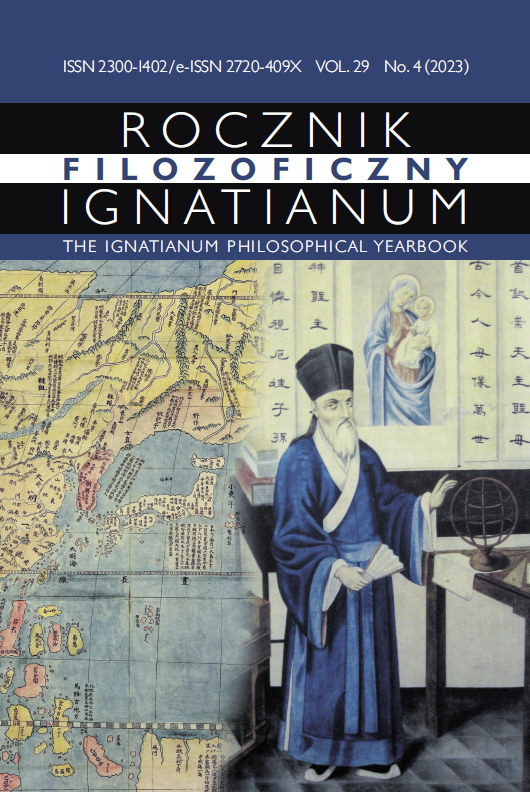Wu Sangui (Usanqueius): Commander and Rebel in the Pages of Historiae Sinarum Imperii by Tomasz Szpot Dunin
Abstract
In his work on Chinese history, Tomasz Ignatius Szpot Dunin SJ did not miss the attitudes of significant Chinese commanders during the historical watershed period of the fall of the Ming dynasty and its replacement by the Manchurian Qing dynasty. One of them was Wu Sangui, who initially supported the Ming against external and internal enemies, only to contribute to the success of the Manchurian invasion at a crucial moment and, after almost three decades of operating under the new dynasty’s sovereignty, to declare obedience to it and lead the so-called Three Feudatories Rebellion. The affair was well-known in Europe and even became the subject of literary interest in the 18th century. Szpot Dunin does not succumb to extreme tendencies in his description, skilfully considers the circumstances of the decision and presents a nuanced yet incisive picture of Wu Sangui’s character, intentions and failures.
References
Archivum Romanum Societatis Iesu (ARSI) Jap. Sin. 102.
de Bary William Theodore, Lufrano Richard, Sources of Chinese Tradition, vol. 2 (New York: Columbia University Press, 2001).
di Cosmo Nicola, The Diary of a Manchu Soldier in Eighteenth-century China. My Service in The Army by Dzengšeo (London–New York: Routledge, 2007). Graff David A., Higham Robin, A Military History of China (Lexington: University Press of Kentucky, 2012).
Hummel Arthur W., Eminent Chinese of the Ch’Ing Period, 1644–1912, vol. 2 (Padstow–New York: Brill, 2010).
Morton William Scott, Lewis Charlton M., Chiny. Historia i kultura, tłum. Bogdan Zemanek (Kraków: Wydawnictwo Uniwersytetu Jagiellońskiego, 2007).
Swope Kenneth M., The Military Collapse of China’s Ming Dynasty. 1618–1644 (London–New York: Routledge, 2014).
Wakeman Jr. Frederick, The Great Enterprise. The Manchu Reconstruction of Imperial Order in Seventeenth-Century China (Berkeley–Los Angeles–London: University California Press, 1985).
Weidmann Paul, Usanquei, oder die Patrioten in Sina. Ein deutsches Originaltrauerspiel in Versen von fünf Auzügen (Wien: Trattner, 1771).
Chang Jen-chung, „The Nature of the «Three Feudatories Rebellion» and the Causes of Its Failure”, Chinese Studies in History 15/1-2 (1981): 7–18.
Hsi Angela N.S., „Wu San-kuei in 1644. A Reappraisal”, The Journal of Asian Studies 34/2 (1975): 443–453.
Wakeman Jr. Frederick, „Rebellion and Revolution. The Study of Popular Movements in Chinese History”, The Journal of Asian Studies 36/2 (1977): 201–237.
Danieluk Robert, „Konfesjonał i pióro: Tomasz Ignacy Szpot Dunin, polski historiograf jezuickiej misji w Chinach”, w: Iesuitae in Polonia – Poloni Iesuitae. Piśmiennictwo łacińskie czasów nowożytnych, red. Jarosław Nowaszczuk (Szczecin: „Volumina.pl”, 2017), 75–108.
Deupmann Christoph, „Römische Helden aus der chinesischen Fremde. Paul Weidmanns «Originaltrauerspiel» Usanquei, oder die Patrioten in Sina”, w: Fremde Helden auf europäischen Bühnen (1600–1900), red. Achim Aurnhammer, Barbara Korte, vol. 5 (Würzburg: Ergon Verlag, 2017), 181–190.
Roth Li Gertraude, „State Building before 1644”, w: The Cambridge History of China, vol. 9, red. Willard J. Peterson (Cambridge: Cambridge University Press, 2008), 9–72.
Spence Jonathan D., „The K’ang-hsi Reign”, w: The Cambridge History of China, vol. 9, red. Willard J. Peterson (Cambridge: Cambridge University Press, 2008), 120–182.
Copyright (c) 2023 Ignatianum University in Cracow

This work is licensed under a Creative Commons Attribution 4.0 International License.
The Yearbook only accepts materials for publication that are free of all conflicts of interest, and that in no way involve conflicts over authorship, copyright, etc. The Editors will take action against any cases of plagiarizing, ghostwriting1, guest/honorary authorship2, etc. Where co-authored work is concerned, the Author listed first is expected to take responsibility for the submission, and is required to make clear the contributions of all of the Co-Authors involved. In the event of the publication owing its existence to funding dedicated to this purpose, this fact should be made clear: e.g. in any note of thanks/acknowledgement, or in a footnote, etc. Explicit notification should be given of any form of reprinting, with the appropriate evidence of permission to publish being furnished as required. Any impropriety on the part of Authors/Reviewers risks exposing them to appropriate responses from the relevant institutions.
______
1 This term refers to instances of a person who has made an essential contribution being omitted from the list of authors, or from notes conveying gratitude and/or acknowledgement.
2 This occurs when a person who has made either an insignificant contribution or no contribution at all nevertheless appears on the list of authors.





